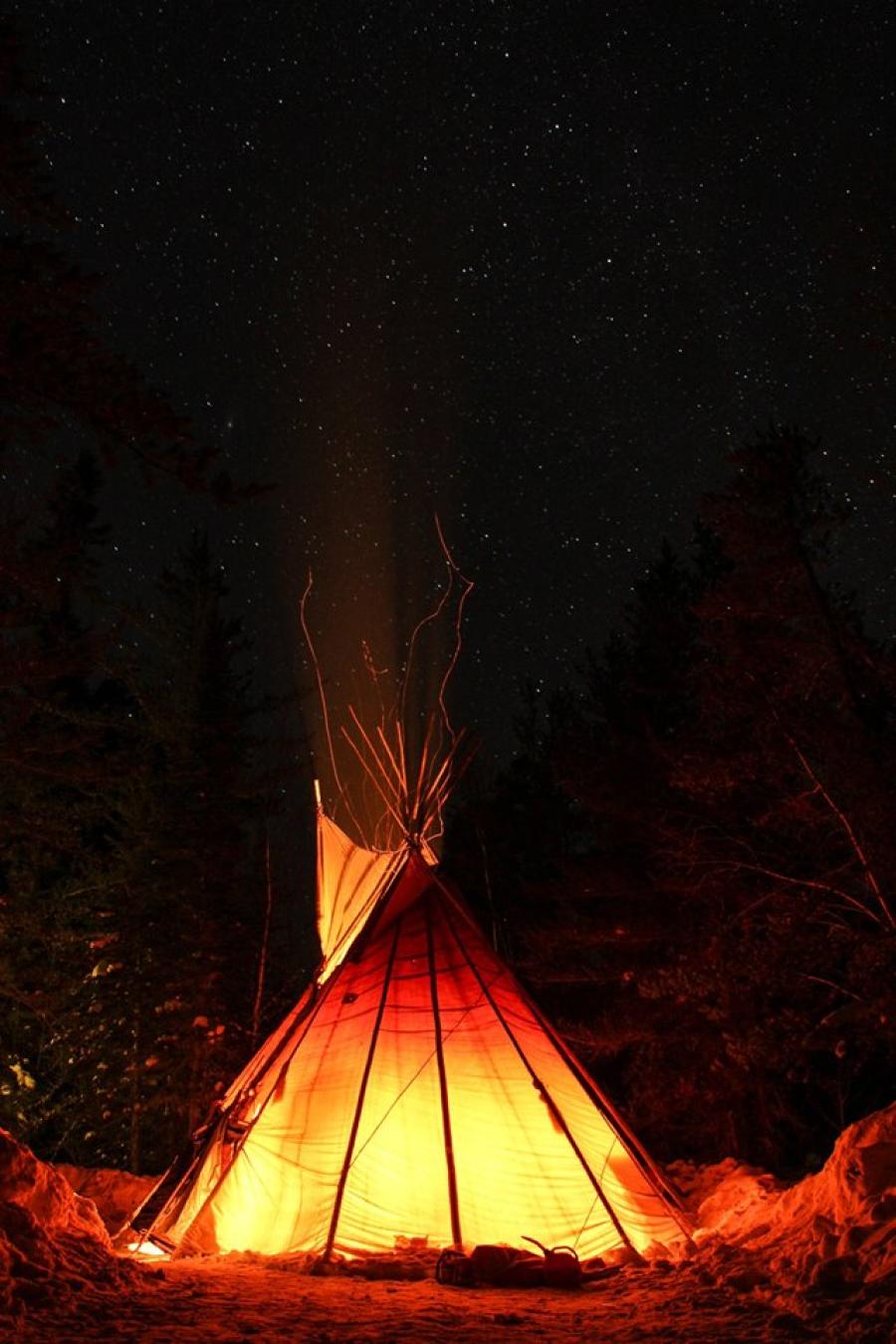Militarism is a form of colonization which takes away from our lives. That future is without hope for us. But, we will fight for our rights. I believe in nonviolence and civil disobedience. I am ready to go to jail, to take blows or die for our cause, because I believe in the struggle for the freedom of my people. I don't want your sympathy, I want your support, your strong and collective support against the oppression of your government. What are need is your resistance." Penote Ben Michel made this plea at a 31 January 1987 conference in Montreal on militarism in Labrador/Nitassinan.
Northwest River, Labrador, a place called Nitassinan, or "our land," by the Innu people who have lived there for some 9,000 years, and a place known as Goose Bay to the Canadian Armed Forces and, more recently, NATO (North Atlantic Treaty Organization), is the site of one of the most enduring and widely recognized struggles against militarism on the North American continent. This is the struggle of the Innu people against the expansion of the military base, from the present 8,000 flights a year to more than 40,000 flights in a low-level flight training center. The Innu people - and recently a New-foundland court decision - maintain that this is their land, and they intend to protect it. The Canadian government, in a bid for the billion-dollar international NATO facilities, sees Goose Bay as a money-making military venture.
The war money and the peace of the land are what bring Rose Gregoire, Innu mother of four; her sister, Elizabeth Penashue; and her friend, Francesca Snow to speak throughout the country in defense of their rights. Armed simply with their own words, the daring resolve of this "small, mother-led band of peace warriors," as Toronto's NOW magazine calls them, is truly a formidable force. Says Snow, "We are not afraid of anything, even if I get shot. We struggle all the way, no matter what happens."
In fact these women and their families have led a resilient occupation at the Goose Bay military base. A string of occupations and demonstrations, as well as the peaceful taking by storm of the base's runways, represents the most significant challenge yet to low-level flights and other war exercises being carried out in the Innu homeland. At one point in the early spring of 1989, these women served 19 days in a provincial jail for occupying the military runway. They were acquitted when the Newfoundland court determined that they sincerely believed they were occupying their own land and hence could not be trespassing. Even then, these women, eight other Innu women, and seven other Innu men did their time, refusing to sign the conditions that would have led to their release. By the summer of 1989, more than 250 arrests had taken place. As the Innu gear up their resistance to the new NATO proposal, more arrests are on the horizon.
The Military Buildup
The Goose Bay military base was built in 1941 as an outlying station linking North America and Europe during World War II. In 1952, the US Air Force signed a 20-year lease to use the base; before the lease expired, the Americans were lending their installations to the British Royal Air Force and its Vulcan bombers. By the mid-1970s, the problem had expanded geometrically. With resistance in European countries to low-flying military flights over densely populated areas, a number of countries began looking greedily toward the Canadian north for new testing zones. By the 1980s, more than 4,000 training flights were being carried out over the 100,000 km2 area. By 1989 there were 8,000 low-level flights a year between April and November - 30 to 50 a day.
The worst is yet to come. In 1980, NATO's military committee sponsored a feasibility study for the construction of a fighter plane training center in Goose Bay. Not to be outdone, Canadian Minister of Defense John Crosby announced in 1985 that the government would spend $93 million to modernize the base, and encouraged new countries to join the war games in the sky. Six countries - Belgium, Great Britain, West Germany, Holland, the United States, and Canada - are now using the skies of Nitassinan more intensely than ever. All of this to put in a bid for the NATO training base - a dubious honor that would result in around 100,000 low-level flights a year (250 "outings" a day), not to mention two to six bombing ranges and realistic replicas of landing strips, hangars, surface-to-air missiles, refineries, industrial plants, and other "enemy" targets.
In the summer of 1989, the Innu learned that an "in principle" decision to go ahead with the full-scale NATO tactical weapons training center had been made. The decision will be announced in December, according to Innu spokespersons. "That means that we have seven months to save our homeland," said Rose Gregoire. "I need to make it entirely clear that if the NATO base is established, Nitassinan will be turned into a war zone and our nation will be utterly destroyed."
"Buzzing" in the North
Buzzing is the term local people use to describe the low-level flights. Jet bombers currently use 38,000 square miles of northern Quebec and Labrador to fly at lower altitudes than are allowed almost anywhere else in the world. West Germany permits no flights below 250 feet; such levels are considered to be too dangerous over populated areas. The Canadian Department of National Defense (DND) and NATO apparently think that Nitassinan is uninhabited; the 15,000 Innu who live there know otherwise.
The low-level flights create terrifying, ear-splitting booms that shatter the otherwise unbroken peace of the north woods. It's said that the natural reflex to throw one's self down upon the ground and lie there for several minutes dumbfounded and shaking from every limb is basically unavoidable. This is a war on the senses. Significant studies have shown that buzzing has devastating effects on the hearing, nervous system, and metabolism of most species living within the northern ecosystem.
The impact on humans is what we can feel. The impact on the caribou hers, the beaver, the fish, the geese, and all the animals on which the Innu rely is what the Innu are fighting. The Innu are totally dependent upon the fragile northern ecosystem. The George River caribou herd, the largest migratory mammal herd in North America (estimated at more than half a million animals), shares this ecosystem with the Innu. The Innu are desperately concerned about the impact of the military on the herd. They say the animals are suffering. "The herd has stopped growing," says biologist Stu Luttich, who has studied the herd for over 15 years. "Mortality rates are increasing and the birth rate is declining." Caribou weakened by stress are easy prey for bears and wolves. The buzzing is creating stress in the herd. That constant stress is also what the Innu are fighting."
"The militarization, that's what you have to fight," says Francesca Snow. "They will destroy the land, they will destroy the animals, and they will destroy your life." When the animals are destroyed, the people are forced off the land, into wage work and into welfare, and the very soul of the community is destroyed. Father Alexis Jouveneau, a priest who has lived with the Innu for many years, says that the people must be allowed to continue their way of life on the land. Jouveneau issued a warning to the Canadian government: "You are destroying not only their lifestyle, you are destroying their whole life so that you may proceed with military exercises. At that point, you might as well build a psychiatric clinic right here, and it will soon be overfilled." If the military goes ahead, says Innu elder Antione Malec, "You will not see us cry, We will not cry. But our hearts will bleed."
"What's going to happen this year," Rose Gregoire says, "is that about five families will be just outside the restricted zone near the range. They are going to walk up to the range and put up a tent to keep it lightly inhabited during the day. They'll be out in the woods hunting, and if the military helicopters come they're going to hide in the woods. If people are living in the bombing range, they are going to come and take them to jail. They don't want that to happen... The people are not going to stop now. They are going to continue. They are going to resist."
How You Can Help
The Innu are asking people to lobby to stop the base in any way that they can and to directly support their struggle. For more information please write:
Greg Penashue
NMIA
Box 119, Sheshatshiu
Nitassinan
Labrador AOP 1MO
Tel.: (709)497-8392
Mennonite Central Committee
General Delivery
Northwest River
Labrador AOP 1MO
Tel.: (709)497-8362
Article copyright Cultural Survival, Inc.



